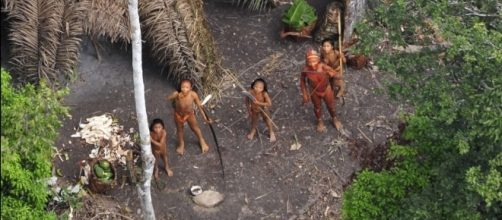On Monday 12 September, authorities in Brazil are reporting that a massacre of members of an uncontacted native tribe has occurred in the jungles of the Amazon rainforest at the hands of illegal gold miners.
The miners, known locally as garimpeiros, were overheard in a bar bragging about executing up to 10 of the isolated tribespeople near Brazil's border with neighboring Peru and Colombia. They then sliced the bodies into small enough pieces to ensure they would not float in the nearby Jandiatuba River where they were abandoned. The person who overheard the concerning story turned over an audio tape of the conversation to authorities.
This person and remains unidentified.
The director of Survival International, Stephen Corry, stated that the Brazilian government's decision to cut desperately needed funding from the agency organized to protect these natives has left them "defenseless against thousands of invaders...who are desperate to steal and ransack their lands."
Tragic, even genocidal massacres like this, however, are nothing new for the indigenous people of South America's lush rainforests.
Part of a historic pattern in Brazil
In the summer of 1993, freelance journalist Jan Rocha of Sao Paulo reported the alleged massacre of 40 indigenous Yanomami Indians by rogue gold miners. According to a survivor of the carnage, the men of a native village near Haximu, Brazil in the northern Amazon had left to attend a drinking party at a different village.
Upon their return, the men found the bodies of men, women, and children cut into pieces among their burning homes. The survivors also reported that gold miners, much like the ones still ravaging the Amazon today, had passed through their peaceful village just prior to the massacre.
Historians have since deemed the number of survivors as reported to be incorrect. Only four or five young Yanomami men were killed in the original attack, but an additional 12, primarily children, were killed in a later confrontation following retaliatory native raids on miners who remained near their village.
The tribespeople involved in the 1993 massacre were different from those killed in recent events, however. The Yanomami people had brief but repeated contact with gold miners leading up to the attacks that led to escalating tensions over the large numbers of miners arriving in the region.
Additional Yanomami demands for more western gifts that had been brought as peace offerings during the initial introduction of the two groups also angered the gold miners.
To avoid more murders of the dwindling indigenous Amazonian people, Corry is calling for the much-delayed recognization of tribal lands and the cessation of opening native territories to profiteers like illegal gold miners.
Could be just the beginning
Carla de Lello Lorenzi, communications director for Survival International in Brazil, highlighted the challenges of investigating the sometimes hazy details of these killings in her interview with the Washington Post. This lack of information, however, alludes to a harrowing possibility that there are far more incidents of brutal killings and genocides in the Amazon than are reported.
The Brazilian National Indian Foundation is in contact with the public prosecutor's office overseeing federal complaints and has urged authorities to investigate the most recent events in the Brazilian borderlands.


